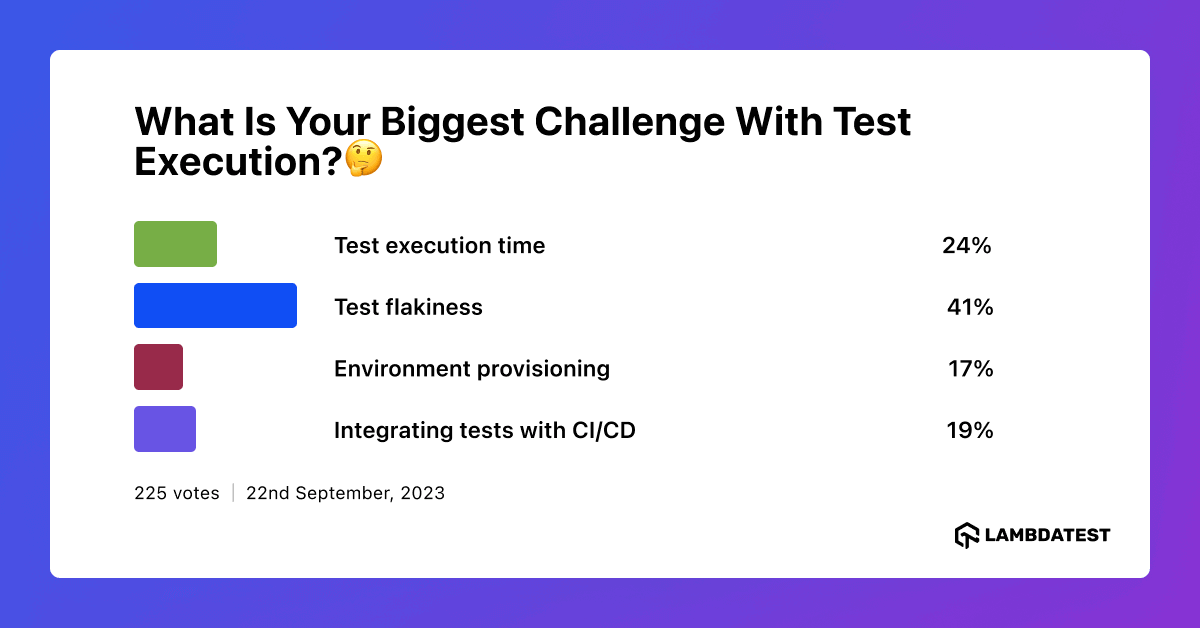Top 9 Challenges In Automation Testing [2025]
Ruchira Shukla
Posted On: February 19, 2024
![]() 78564 Views
78564 Views
![]() 13 Min Read
13 Min Read
Automation testing has become a necessity in the world of DevOps and Agile. Effective automation testing can be an awesome productivity booster for the testing team and an overall system quality enhancer in the long run. However, the most difficult element of starting with test automation is making sure it is used correctly.
Those who have attempted to set up test automation will attest to the fact that it is not a cakewalk.
Understanding the practical hurdles in test execution is crucial for developing effective automation strategies. To gain deeper insights into these challenges, we conducted a social media poll asking professionals, ‘What is your biggest challenge with test execution?
The responses we received shed light on the diverse and complex issues faced in the field, and how important it is to carry out a well-thought-out test automation strategy.

In this article on the automation testing challenges, we will discuss the top 9 key challenges in automation testing faced by developers and organizations and how to overcome the test automation challenges.
TABLE OF CONTENTS
- Why Is Automation Testing Important?
- Key Challenges in Automation Testing
- Finding the Right Framework and Tool
- Effective communication & collaboration in team
- Identifying the Test Automation Strategy
- Setting realistic expectations of automation
- High Initial Investment
- Inadequate Testing Infrastructure
- Problems With Data Reliance
- Finding the Right Skills
- Stakeholders and End-Users Expectations
- Frequently Asked Questions
Why Is Automation Testing Important?
The most important reason to utilize automated testing is to obtain a high-quality product with exceptional performance that offers several advantages. It results in a significant reduction in maintenance costs and a significant increase in software performance with faster Time to Market (TTM). In terms of budget, the importance of automation testing lies in charge reductions because the human is no longer required for anything other than the test’s maintenance. Automated testing aims to make testing as simple as feasible with scripts.
If you are new to automation in testing or want to migrate from manual testing to automation testing, this article on how to move from manual to automation testing will help you get started.
Key Challenges in Automation Testing
An effective continuous testing plan is one of the important components in a software development organization. Continuous testing necessitates the use of end-to-end automated testing, which allows for a better understanding of application quality early in the development cycle.
It sounds fantastic, and it certainly is. However, as with any other development process, moving to an automated testing strategy frequently means dealing with common mistakes that can make this period unpleasant.
Here are the key challenges faced by developers and QAs in automation testing:
- Finding the Right Framework and Tool
- Effective Communication & Collaboration in Team
- Identifying the Test Automation Strategy
- Setting Realistic Expectations of Automation
- High Initial Investment
- Inadequate Testing Infrastructure
- Problems With Data Reliance
- Finding the Right Skills
- Stakeholders and End-Users Expectations
1. Finding the Right Framework and Tool
Finding the right automation tool is a very crucial challenge in automation testing for the success of automation. There are a lot of tools available, both licensed as well as open-source, which makes it difficult to choose. The choice of tool depends upon the kind of application and the extent of automation testing. Before selecting a particular tool, the test engineer should evaluate the pros and cons of each tool and consider based on the basis of the following points:
- Ease of use
- Scalability
- Maintainability
- Integration with third-party tools like Github, Jira, Jenkins, Maven/Gradle, etc.
No matter what testing methodology we use, if we do not have a tool that matches the business requirement, automation tends to fail eventually. There are several top reasons for test automation failure.
Researching tools and determining the best-suited one is a difficult task in and of itself. Likewise, this is a challenge in itself to research tools and find out the most appropriate one. Nevertheless, responses from the above stats indicate that Selenium is the preferred and one of the most best test automation frameworks among all.
A key part of this automation testing stack is the grid of devices used. Testing can never be comprehensive unless the tests are run on real devices to mimic real user conditions. Unfortunately, setting up a real device lab is expensive, cumbersome, and requires constant updations. Picking a real device cloud could be a great option.
Choosing the AI-Powered test orchestration and execution platforms like LambdaTest gives you access to more than 3000 real devices on the cloud, running real operating systems to perform automation testing. In addition, this cross browser testing platform allows users to test public or locally hosted web apps on various browsers, operating systems, and devices.
LambdaTest provides developers and testers with a single integrated ecosystem in which they can securely perform all their tests. This can help you achieve higher levels of efficiency and test coverage while reducing the costs associated with setting up and maintaining test environments.
You can subscribe to the LambdaTest YouTube Channel and stay updated with the latest videos around Cloud testing, What is Selenium WebDriver, CI/CD, and more.
2. Effective Communication & Collaboration in Team
Lack of communication and collaboration among the team is one of the key challenges in automation testing. Since automation testing requires significant investment and gives long-term ROI (Return On Investment) instead of instant gratification, its success is very much dependent on effective communication among all stakeholders.
Wondering how to calculate your ROI? This article on how to calculate your ROI with test automation will help you make smart decisions.
Business analysts, developers, and project managers should discuss the test cases that need to be automated and the necessary functionality. So planning a strategy that is in line with all the respective stakeholders is a challenge. Also, to get a green light from management on the strategic timeline, making necessary changes in the product is not an easy task.
To overcome this, the automation team should try to make things transparent among all identified risks at the initial stage and communicate them as soon as possible.
3. Identifying the Test Automation Strategy
Without a proper test automation strategy, the efficiency of technology will be lost. This is like a body without a brain. Choosing the right strategy is another key challenge in automation testing that is instrumental in the success of automation and in showing business values. So what is a test automation strategy?
Simply putting a test automation strategy is a microcosm of the larger test strategy. Automation is a part of the overall testing process and should be considered thoughtfully. This is another obstacle or one of the key challenges in automation testing as test engineers would find it difficult to chalk out a plan with so many dimensions to consider.
To deduce an effective strategy first, one should understand what is the need for strategy? A strategy should typically address the following:
- What are the risks, capabilities, and functionalities, and how to inform the stakeholders, i.e., to arrive at a stable and repeatable communication process?
- Setting our goals and plans.
- Conceptualize the overall thought process and proof of that concept.
- Auditing tool where you can go back and check your schedule and what has actually been done.
So ideally, to start a test automation strategy, one should take into account the following:
- Define and identify high business value tests.
- Understand your technology, tools, and resources.
- Identify your risks.
- Define your DevSecOps.
- Consider your testing environment.
- Consider your test data management.
- Consider agile tools.
4. Setting Realistic Expectations of Automation
A lot has been said about test automation. But unfortunately, organizations tend to believe that automation would bring the magic that would solve all their issues which is not true.
The expectations with test automation should be realistic and communicated clearly to higher management. In addition, what and how much should be automated to reap maximum benefit should be well documented. As already discussed, a well-defined automation strategy can play a vital role in setting up realistic expectations.
5. High initial investment
Automation needs a high initial investment in terms of tools, skilled resources, infrastructure, etc. Sometimes it might require licensing costs on top of operational costs. Moreover, even for open-source tools like Selenium, one must take into account the cost incurred in training the resources and setting up the grid. This is a major challenge in automation testing as it is sometimes difficult to convince the management to invest in it.
To prove to the management that the financial benefits of automation are substantial, one should calculate the cost incurred in the production defects v/s cost involved in setting up automation.
Don’t forget about the intangible benefits, such as the opportunity to update and adjust old workflows and procedures to boost efficiency by eliminating repetition or redistributing staff.
6. Inadequate Testing Infrastructure
Another major challenge in automation testing is a lack of infrastructure to enable proper test coverage and execution speed. For example, consider the scenario in which an application must be tested on a variety of operating systems and browsers. It’s critical to execute test scripts in parallel to run tests against many configurations in an acceptable amount of time. And in order to achieve this, the testing infrastructure must be extremely robust in order to support parallel testing.
While a company that is just getting started with test automation may not be well prepared to develop an internal testing infrastructure, there are other choices, such as a cloud-based testing infrastructure.
AI-powered test orchestration and execution platforms like LambdaTest provides a scalable infrastructure for startups and enterprises to fulfill their test automation needs. In addition, it eliminates the need to manage the in-house infrastructure so that the organizations can focus more on quality.
LambdaTest comes with an AI-Native end-to-end test orchestration cloud – HyperExecute which is up to 70% faster than any traditional cloud grids. With HyperExecute, you can overcome all the challenges associated with poor test infrastructure, high test execution time, and flaky tests, while running tests at scale.
7. Problems With Data Reliance
One of the most challenging aspects of test automation is data management. When the test script is executed, the data must be in a specific state; otherwise, it can cause serious issues in several scenarios. What happens, for example, if the test script is executed simultaneously in several test environments and configurations?
Will it fail if the same data is used in multiple instances of the script? Any change to the data in one test execution instance can cause another instance to fail. What if the data of a script is built up by the execution of another test script?
Developing self-contained and independent test scripts is the most effective technique to deal with these data management difficulties. All test scripts should be written in such a way that they create and clean all of the data needed for successful execution. In this case, the team must eliminate the possibility of test failure owing to data-related concerns.
8. Finding the Right Skills
From designing a test automation framework to writing test scripts, dilemma and coding skills are required. Most test automation tools are really only effective when manned by individuals who can design and maintain automation frameworks, build solutions, and test scripts accurately. They must also be able to deal with unexpected technical problems.
Since automation frameworks differ in terms of features and operability, they must be familiar with the design and implementation protocols of the framework. Therefore, it would be wrong to assume that manual testers can work on automation tools or build a solution without proper training. However, investing in training and hiring new skilled resources is also challenging. It also demands time and is not feasible for organizations that want to scale up quickly.
9. Stakeholders and End-Users Expectations
No matter how good your tools or resources are, you must constantly keep in mind that testing cannot be done in a vacuum. It has one goal: to improve your product.
While test automation is useful for checking for flaws automatically, humans are still required to finish the non-automated testing phases. And these tests provide plenty of useful data for making the best possible decisions when it comes to developing the system — not for the benefit of developers but the benefit of end-users.
As a result, you must make certain that your testing team, management, and other stakeholders all agree on and understand the anticipated outcomes of your automation strategy.
Conclusion
Test automation is a continuous development and enhancement process. In this article on key challenges in automation testing, we have seen how by focusing more on fast value rather than fast tests, one can ensure the right approach to automation. Tests that run fast but miss the defects do not add any value. So the approach should be reducing the bugs in the production to reduce the costs that incur to resolve them at a later stage.
Automation is challenging as well as expensive. But the result can be a better quality product in front of the customer and a faster release cycle
Frequently Asked Questions (FAQs)
What are three major challenges in testing software?
- Lack of communication
- Missing Documentation
- Inadequate Testing
What are the automation challenges that the QA team faces while testing?
Using the wrong tools might make automation difficult. Automating ineffective tests while ignoring critical ones will result in product quality flaws. Testing at the incorrect moment will create roadblocks on the approach to CI/CD adoption. Furthermore, leaning too heavily on automation can result in poor testing.
What are the strengths and weaknesses of automated testing and manual testing?
- The expense is lower in the short run. Purchasing software automation solutions might be costly. You won’t have to invest the same amount of money on software if you use manual testing.
- Real user issues are more likely to be discovered.
- Manual testing has a lot of flexibility.
Got Questions? Drop them on LambdaTest Community. Visit now
















